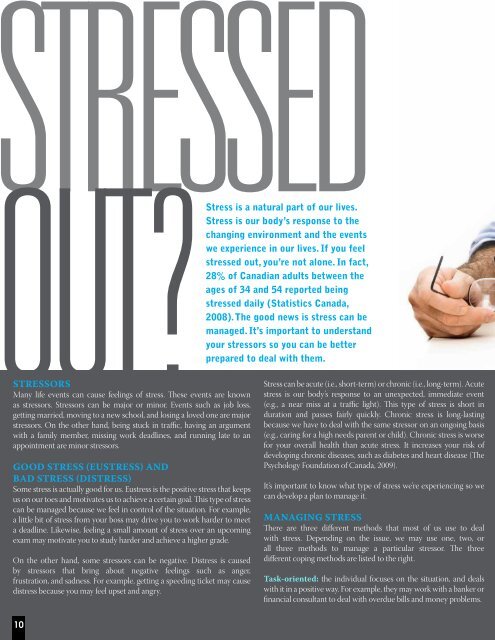Healthy Minds Matter Newsletter and Brochure (pdf)
Healthy Minds Matter Newsletter and Brochure (pdf)
Healthy Minds Matter Newsletter and Brochure (pdf)
You also want an ePaper? Increase the reach of your titles
YUMPU automatically turns print PDFs into web optimized ePapers that Google loves.
tressedStress is our body’s response to theis a natural part of our lives.changing environment <strong>and</strong> the eventswe experience in our lives. If you feelstressed out, you’re not alone. In fact,28% of Canadian adults between theages of 34 <strong>and</strong> 54 reported beingstressed daily (Statistics Canada,2008). The good news is stress can bemanaged. It’s important to underst<strong>and</strong>your stressors so you can be betterprepared to deal with them.ut?StressStressorsMany life events can cause feelings of stress. These events are knownas stressors. Stressors can be major or minor. Events such as job loss,getting married, moving to a new school, <strong>and</strong> losing a loved one are majorstressors. On the other h<strong>and</strong>, being stuck in traffic, having an argumentwith a family member, missing work deadlines, <strong>and</strong> running late to anappointment are minor stressors.Good Stress (Eustress) <strong>and</strong>Bad Stress (Distress)Some stress is actually good for us. Eustress is the positive stress that keepsus on our toes <strong>and</strong> motivates us to achieve a certain goal. This type of stresscan be managed because we feel in control of the situation. For example,a little bit of stress from your boss may drive you to work harder to meeta deadline. Likewise, feeling a small amount of stress over an upcomingexam may motivate you to study harder <strong>and</strong> achieve a higher grade.On the other h<strong>and</strong>, some stressors can be negative. Distress is causedby stressors that bring about negative feelings such as anger,frustration, <strong>and</strong> sadness. For example, getting a speeding ticket may causedistress because you may feel upset <strong>and</strong> angry.Stress can be acute (i.e., short-term) or chronic (i.e., long-term). Acutestress is our body’s response to an unexpected, immediate event(e.g., a near miss at a traffic light). This type of stress is short induration <strong>and</strong> passes fairly quickly. Chronic stress is long-lastingbecause we have to deal with the same stressor on an ongoing basis(e.g., caring for a high needs parent or child). Chronic stress is worsefor your overall health than acute stress. It increases your risk ofdeveloping chronic diseases, such as diabetes <strong>and</strong> heart disease (ThePsychology Foundation of Canada, 2009).It’s important to know what type of stress we’re experiencing so wecan develop a plan to manage it.Managing StressThere are three different methods that most of us use to dealwith stress. Depending on the issue, we may use one, two, orall three methods to manage a particular stressor. The threedifferent coping methods are listed to the right.Task-oriented: the individual focuses on the situation, <strong>and</strong> dealswith it in a positive way. For example, they may work with a banker orfinancial consultant to deal with overdue bills <strong>and</strong> money problems.10







